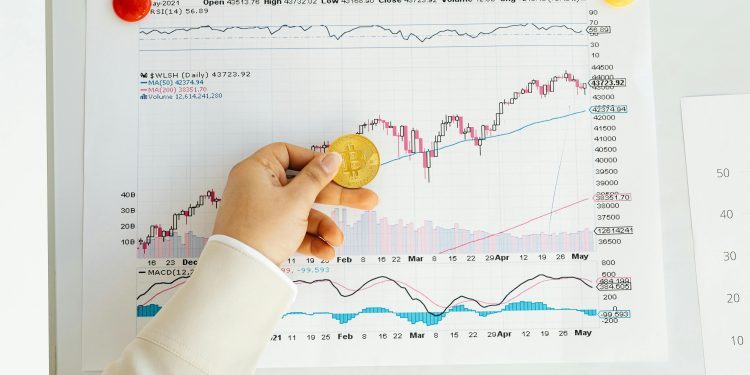Introduction: Bitcoin ETFs Enter the Financial Mainstream
The approval and launch of Bitcoin Exchange-Traded Funds (ETFs) mark a significant milestone for the cryptocurrency industry. A Bitcoin ETF allows investors to gain exposure to Bitcoin without having to buy, store, or manage the digital asset directly. As ETFs become part of regulated financial markets, their influence on Bitcoin’s price and adoption is becoming increasingly clear.
In this guide, we’ll dive into what Bitcoin ETFs are, explore the types of ETFs available, and discuss how they impact Bitcoin’s price, both positively and negatively. We’ll also touch on what the future holds for these investment vehicles in the evolving crypto ecosystem.
1. What Is a Bitcoin ETF?
A Bitcoin ETF is a type of financial product that tracks the price of Bitcoin. It enables investors to buy shares on traditional stock exchanges, just like any other ETF, such as those tracking gold or major stock indices.
There are two key types of Bitcoin ETFs:
- Spot Bitcoin ETFs: These hold actual Bitcoin in reserve, giving investors exposure to the real-time price of Bitcoin.
- Futures Bitcoin ETFs: These track the price of Bitcoin futures contracts rather than the spot price. Futures ETFs involve contracts to buy Bitcoin at a specific price on a future date, introducing additional speculation and management complexities.
2. How Do Bitcoin ETFs Work?
Mechanics of Spot Bitcoin ETFs
Spot Bitcoin ETFs purchase real Bitcoin and store it with a custodian. As investors buy ETF shares, the ETF provider adds more Bitcoin to its reserves to back the shares. Conversely, when investors sell shares, the ETF redeems Bitcoin, ensuring that each share reflects the asset’s market price. This process ensures real-time price tracking and increases demand for Bitcoin as the ETF provider needs to purchase and hold the asset (Chainalysis).
Futures Bitcoin ETFs vs. Spot ETFs
Unlike spot ETFs, futures Bitcoin ETFs do not hold Bitcoin directly. Instead, they use futures contracts traded on regulated exchanges like the Chicago Mercantile Exchange (CME). While futures ETFs provide exposure to Bitcoin’s price movements, they can diverge from the actual spot price due to market speculation and the complexities of rolling over contracts (ETF.com).
3. The Impact of Bitcoin ETFs on Price
a) Increased Institutional Adoption and Demand
The launch of Bitcoin ETFs has been a pivotal moment for Bitcoin’s mainstream acceptance. Institutions such as BlackRock and Fidelity have launched Bitcoin ETFs, making it easier for traditional investors to gain exposure to Bitcoin through familiar financial products (INO.com). This influx of capital often boosts Bitcoin’s price by increasing demand.
Bitcoin’s rally in early 2024 was largely driven by expectations surrounding the approval of these ETFs. BlackRock’s iShares Bitcoin ETF and Fidelity’s Wise Origin Bitcoin ETF each attracted over $1 billion in inflows within their first week of trading, reflecting significant interest from institutional and retail investors (ETF.com).
b) Reduced Complexity for Retail Investors
ETFs lower the barrier to entry for retail investors by eliminating the need for wallets, private keys, and exchanges. This simplified investment process draws more people into Bitcoin, increasing overall liquidity and potentially stabilizing Bitcoin’s price over time.
c) Supply and Demand Dynamics
As spot ETFs buy Bitcoin to back shares, they remove Bitcoin from circulation, tightening supply. This supply shock can push Bitcoin’s price higher, especially if investor interest remains strong. However, the price effect will also depend on institutional inflows and market sentiment (Chainalysis, etf.com).
4. Risks and Volatility Associated with Bitcoin ETFs
a) Bitcoin’s Price Volatility
Bitcoin ETFs are not immune to the underlying volatility of Bitcoin. Sharp price swings can affect the value of ETF shares, potentially leading to capital losses for investors. For example, following the launch of Bitcoin ETFs in January 2024, prices dipped briefly due to profit-taking and market corrections (INO.com).
b) Management Fees and Costs
While ETFs simplify Bitcoin investments, they come with management fees. These fees—ranging from 0.12% to 0.25% annually—can impact investor returns over time (ETF.com). Investors must weigh these costs against the convenience and security offered by the ETF.
c) Regulatory Risks
Although Bitcoin ETFs bring greater regulatory oversight, they are still subject to regulatory uncertainty. Changes in government policies or financial regulations could impact the performance and availability of Bitcoin ETFs in the future (INO.com).
5. Long-Term Implications for Bitcoin’s Price and Adoption
a) Greater Market Liquidity and Stability
Bitcoin ETFs are likely to increase liquidity by attracting a broader investor base. This could help stabilize Bitcoin’s price over the long term by reducing sudden spikes or crashes caused by speculative trading (ETF.com). Additionally, as more capital flows into ETFs, Bitcoin may evolve from a speculative asset into a more stable store of value, akin to gold.
b) Potential for Broader Adoption in Retirement Plans
Fidelity’s decision to include Bitcoin ETFs in 401(k) retirement plans signals the growing acceptance of Bitcoin as part of diversified investment portfolios (INO.com). This trend could drive significant demand for Bitcoin, particularly as retirement fund managers begin allocating small portions of their portfolios to the asset.
c) ETF Competition and Lower Fees
With multiple ETF providers competing for market share, management fees may decrease over time, making Bitcoin ETFs even more attractive. For example, both BlackRock and Fidelity have reduced their expense ratios to gain an edge in the crowded market (ETF.com).
6. Conclusion: A Milestone in Bitcoin’s Journey
The approval and launch of Bitcoin ETFs in 2024 mark a turning point for Bitcoin. These financial products provide a regulated and accessible way for investors to gain exposure to Bitcoin, driving institutional adoption and enhancing liquidity. While ETFs bring benefits, such as simplified investment processes and increased demand, they also carry risks related to volatility, management fees, and regulatory changes.
Ultimately, Bitcoin ETFs could help Bitcoin transition from a speculative asset to a mainstream investment, solidifying its place in the global financial ecosystem. As more capital flows into these ETFs, Bitcoin’s price discovery and stability are likely to improve, paving the way for broader adoption among retail and institutional investors alike.
Investors should approach Bitcoin ETFs with a long-term perspective, mindful of the volatility that still defines the cryptocurrency market. With proper risk management, Bitcoin ETFs represent a powerful tool for incorporating digital assets into diversified portfolios and accelerating the mainstream adoption of Bitcoin.
















